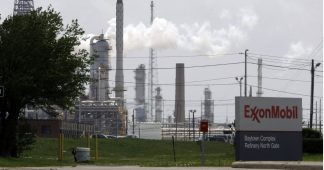By Geoffrey Supran and Naomi Oreskes
23 August 2017
Abstract
This paper assesses whether ExxonMobil Corporation has in the past misled the general public about climate change. We present an empirical document-by-document textual content analysis and comparison of 187 climate change communications from ExxonMobil, including peer-reviewed and non-peer-reviewed publications, internal company documents, and paid, editorial-style advertisements (‘advertorials’) in The New York Times. We examine whether these communications sent consistent messages about the state of climate science and its implications—specifically, we compare their positions on climate change as real, human-caused, serious, and solvable. In all four cases, we find that as documents become more publicly accessible, they increasingly communicate doubt. This discrepancy is most pronounced between advertorials and all other documents. For example, accounting for expressions of reasonable doubt, 83% of peer-reviewed papers and 80% of internal documents acknowledge that climate change is real and human-caused, yet only 12% of advertorials do so, with 81% instead expressing doubt. We conclude that ExxonMobil contributed to advancing climate science—by way of its scientists’ academic publications—but promoted doubt about it in advertorials. Given this discrepancy, we conclude that ExxonMobil misled the public. Our content analysis also examines ExxonMobil’s discussion of the risks of stranded fossil fuel assets. We find the topic discussed and sometimes quantified in 24 documents of various types, but absent from advertorials. Finally, based on the available documents, we outline ExxonMobil’s strategic approach to climate change research and communication, which helps to contextualize our findings.
1. Introduction
In 2016, Attorneys General (AGs) of 17 US states and territories announced that they ‘are exploring working together on key climate change-related initiatives, such as ongoing and potential investigations’ into whether ExxonMobil Corporation and other fossil fuel companies may have violated, variously, racketeering, consumer protection, or investor protection statutes through their communications regarding anthropogenic global warming (AGW) [1, 2]. (Unless specified otherwise, we refer to ExxonMobil Corporation, Exxon Corporation, and Mobil Oil Corporation as ‘ExxonMobil’.) As part of a probe that began in 2015, New York Attorney General Eric Schneiderman has issued multiple subpoenas to ExxonMobil under the state’s Martin Act and alleged that the company’s accounting of climate risk ‘may be a sham’ [3–6]. Massachusetts Attorney General Maura Healey is simultaneously investigating ExxonMobil, stating, ‘Fossil fuel companies that deceived investors and consumers about the dangers of climate change should be held accountable’ [7, 8]. US Virgin Islands Attorney General Claude Walker has said that he is investigating ExxonMobil for potentially violating the territory’s anti-racketeering law [9]. Also in 2016, the US Securities and Exchange Commission (SEC) began a federal investigation into whether ExxonMobil appropriately discloses the business risks of AGW, and how it values its assets and reserves [10]. We offer no view on the legal issues raised by ongoing investigations.
ExxonMobil has responded stating, ‘We unequivocally reject allegations that ExxonMobil suppressed climate change research contained in media reports that are inaccurate distortions of ExxonMobil’s nearly 40 year history of climate research. We understand that climate risks are real. The company has continuously, publicly and openly researched and discussed the risks of climate change, carbon life cycle analysis and emissions reductions’ [11]. In particular, ExxonMobil’s website and statements offer a ’10 page document listing the over 50 peer-reviewed articles on climate research and related policy analysis from ExxonMobil scientists from 1983 to the present’ [11–15]. ExxonMobil argues that this list, entitled ‘Exxon Mobil Contributed Publications’, ‘undercuts the allegation…that ExxonMobil sought to hide our research.’ The company has also published some of its internal company documents, originally made public by journalists at InsideClimate News (ICN) [16, 17] (and simultaneously reported by Columbia University’s Graduate School of Journalism and the Los Angeles Times [18]), to demonstrate that ‘allegations are based on deliberately cherry-picked statements’ [14]. ‘Read all of these documents and make up your own mind,’ ExxonMobil has challenged [14].
This paper takes up that challenge by analyzing the materials highlighted by the company, and comparing them with other publicly available ExxonMobil communications on AGW. The issue at stake is whether the corporation misled consumers, shareholders and/or the general public by making public statements that cast doubt on climate science and its implications, and which were at odds with available scientific information and with what the company knew. We stress that the question is not whether ExxonMobil ‘suppressed climate change research,’ but rather how they communicated about it [11].
Our analysis covers the publication period of the documents made available by ExxonMobil: 1977–2014. These documents include peer-reviewed and non-peer-reviewed publications (academic papers, conference proceedings, reports, company pamphlets, etc) and internal documents. Our analysis compares these documents with ExxonMobil’s public outreach in the form of paid, editorial-style advertisements—known as ‘advertorials’—published on the Op-Ed page of The New York Times (NYT) [19]. We focus on advertorials because they come directly from ExxonMobil and are an unequivocally public form of communication ‘designed to affect public opinion or official opinion’ [20]. Kollman has found that advertorializing is second only to mobilizing group members as the most commonly used outside lobbying technique [20, 21]. We examine whether these communications sent consistent messages about the state of climate science and its implications, or whether there is a discernable discrepancy between the company’s public and private communications.
Our study offers the first empirical assessment and intercomparison of ExxonMobil’s private and public statements on AGW2. By bringing to bear the quantitative methodologies of consensus measurement [22, 23] and content analysis [24–28], our results add to (i) earlier analyses of ExxonMobil’s communication practices [19, 20, 29–36], (ii) qualitative accounts of the company’s AGW communications [17, 18, 37–39], and (iii) the application of consensus measurement/content analysis to AGW communications [26–28, 40, 41]. In addition, this study contributes to the broader literature on climate change denial [42–48], corporate issue management [21, 35, 49, 50] and misinformation strategies [51–55], and the social construction of ignorance [56–58].
Read more at https://iopscience.iop.org/article/10.1088/1748-9326/aa815f











